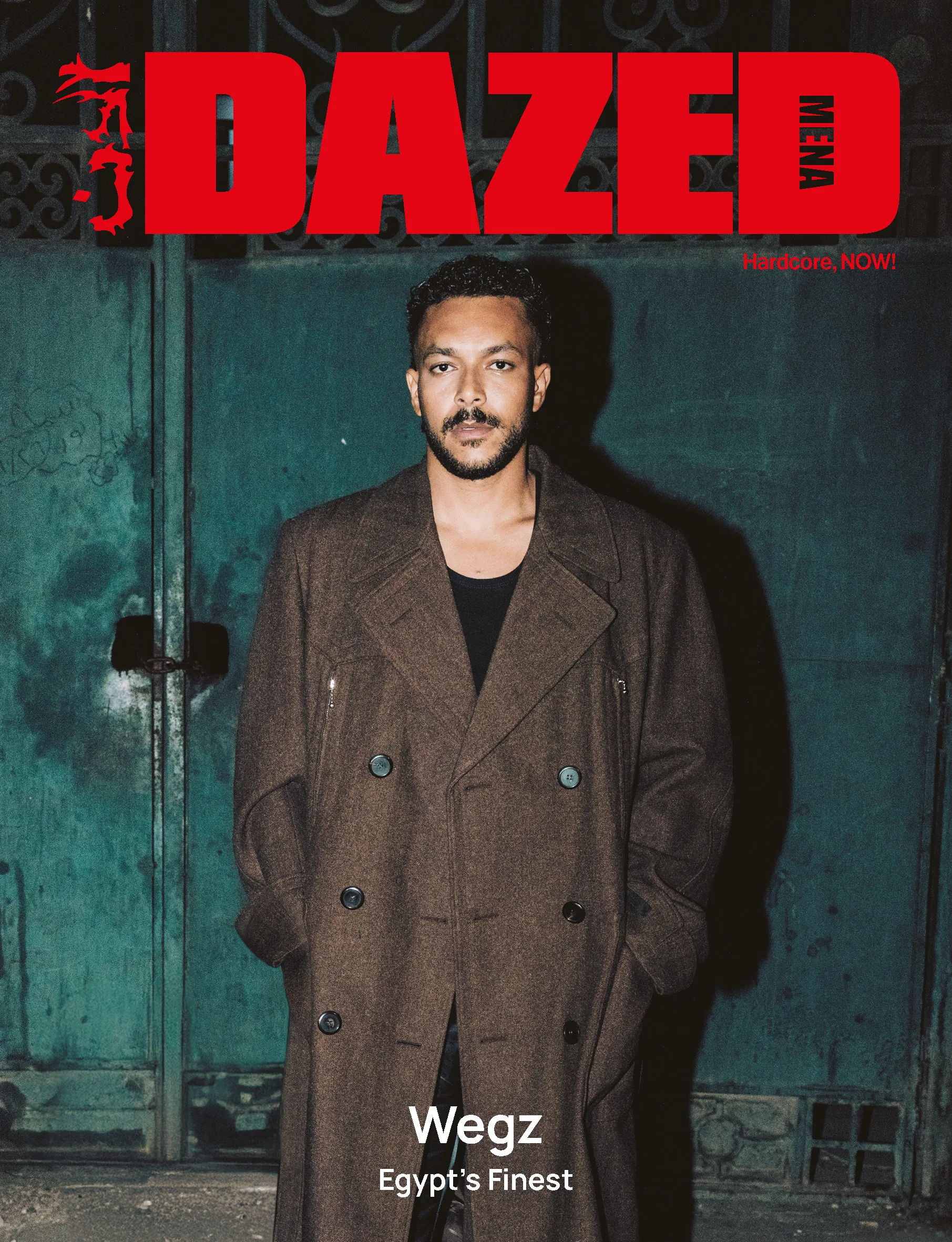 Posted in
Feature, Dazed MENA issue 03
Posted in
Feature, Dazed MENA issue 03
Wegz: View from the top
Text Omar Ghonem | Photography Kafrawy
Wegz is slouched into a studio couch in Cairo, phone in hand, scrolling through a playlist that ricochets from up-and-coming US rappers – Xaviersobased, Che, 2hollis – to early Lil B deep cuts. Outside, his face is everywhere from billboards and TV ads to streaming charts—a constant reminder that he has already won the game. But inside, under the dim studio light, there’s no sense of victory. “If you think you’ve found success, you’ve failed,” he says.
For years, the Egyptian rapper has been the preeminent voice of a generation that pushed rap from the alleyways onto the country’s main stage. Now, on the brink of releasing his first full-length album and stepping into his first lead film role, Wegz is looking past the peak that most artists spend their lives chasing. The question is no longer whether he’ll get there; it’s where will someone who’s already at the top go next?

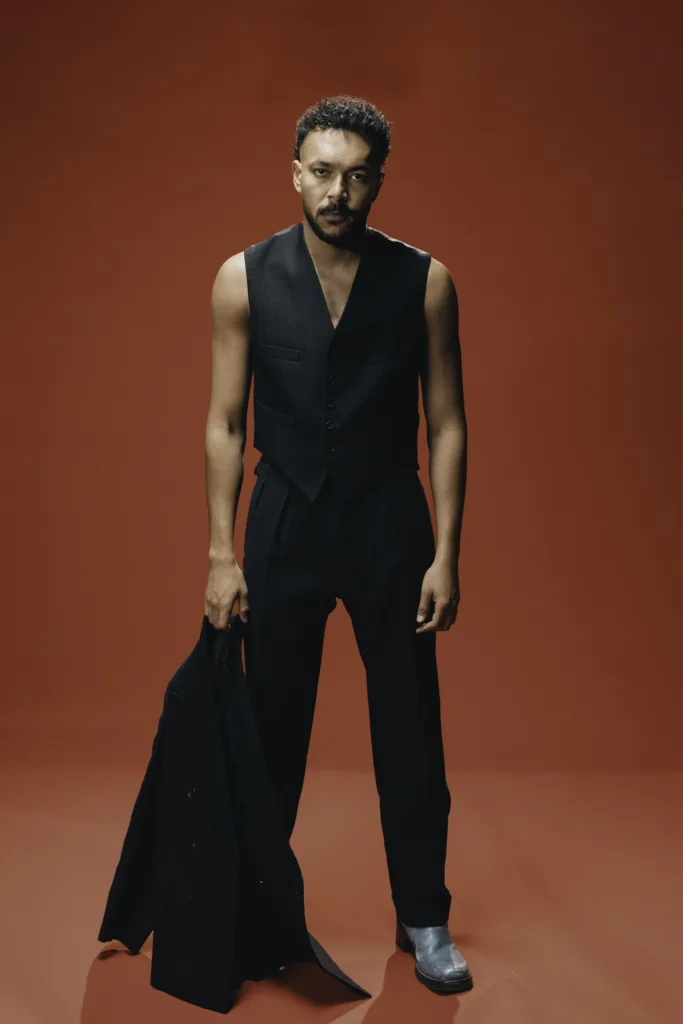
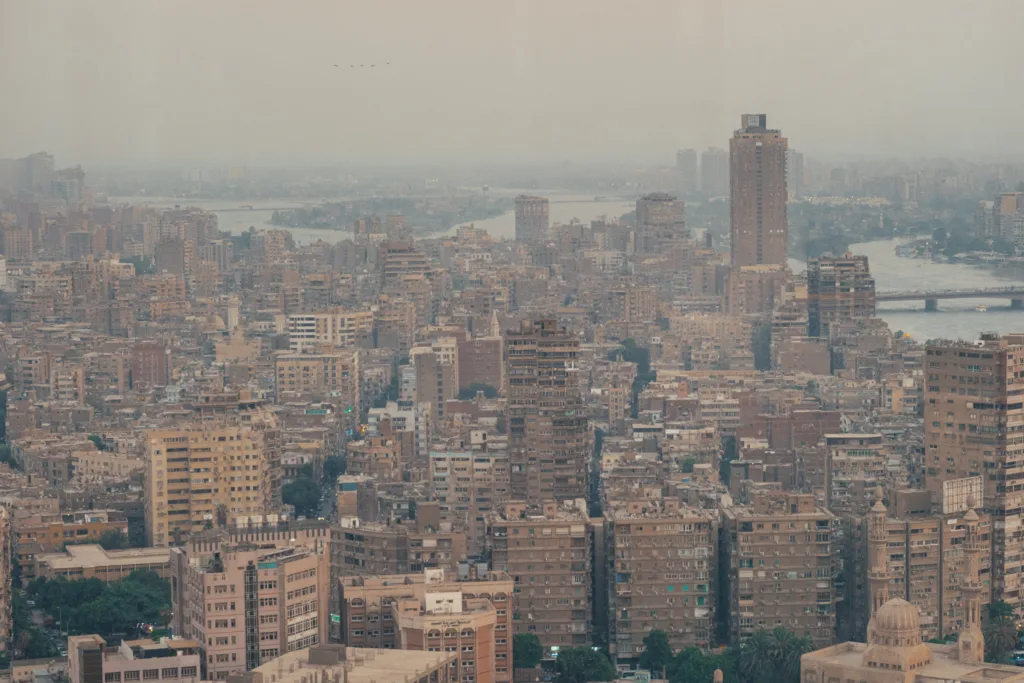
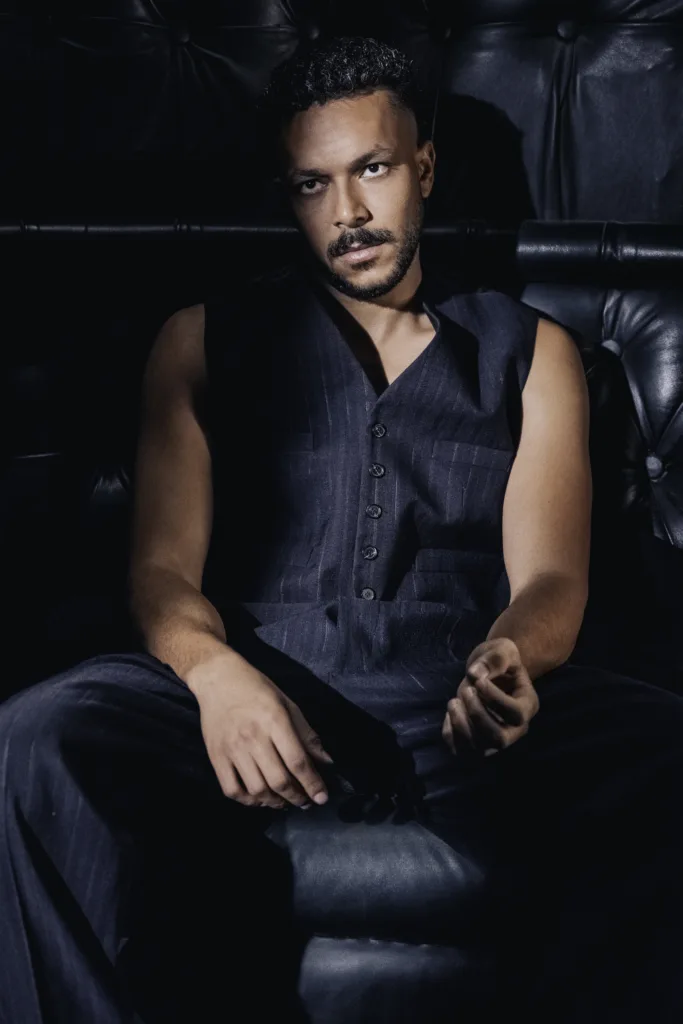
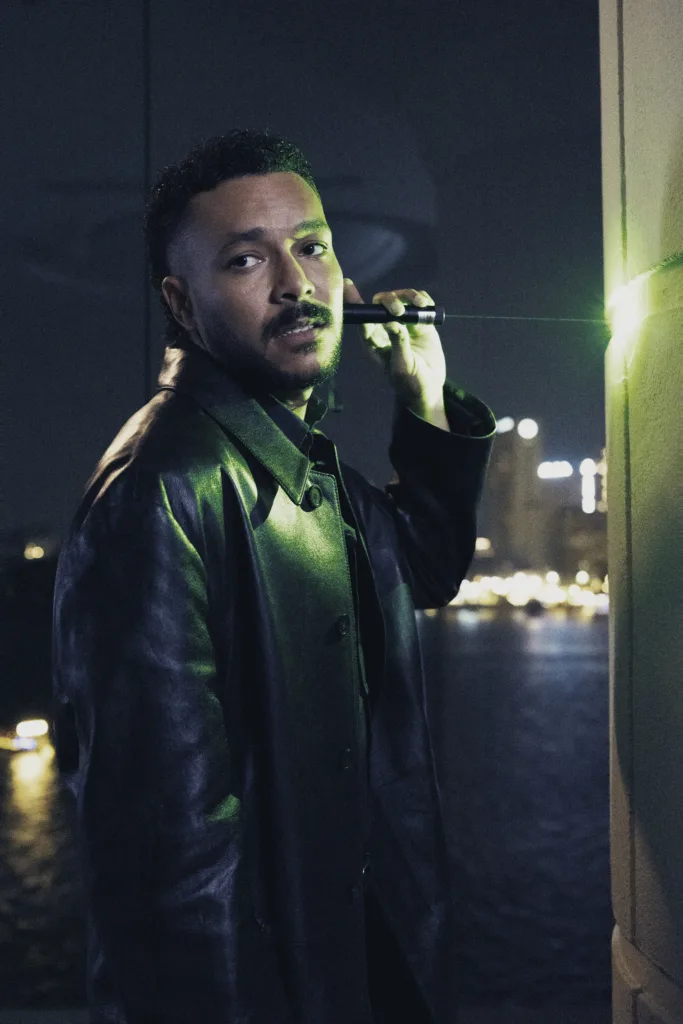
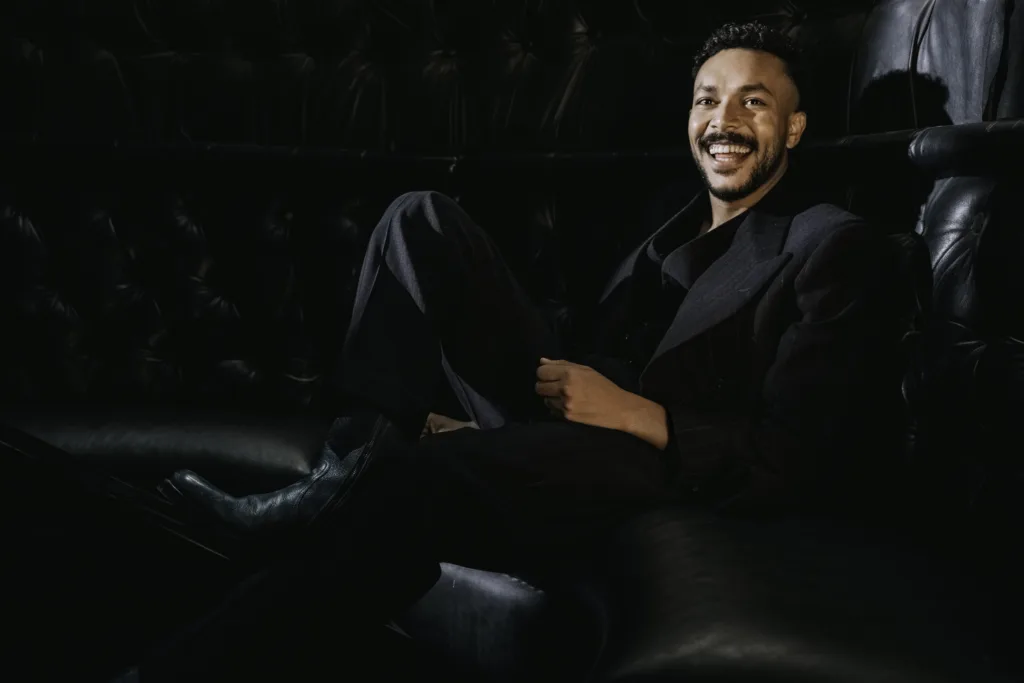
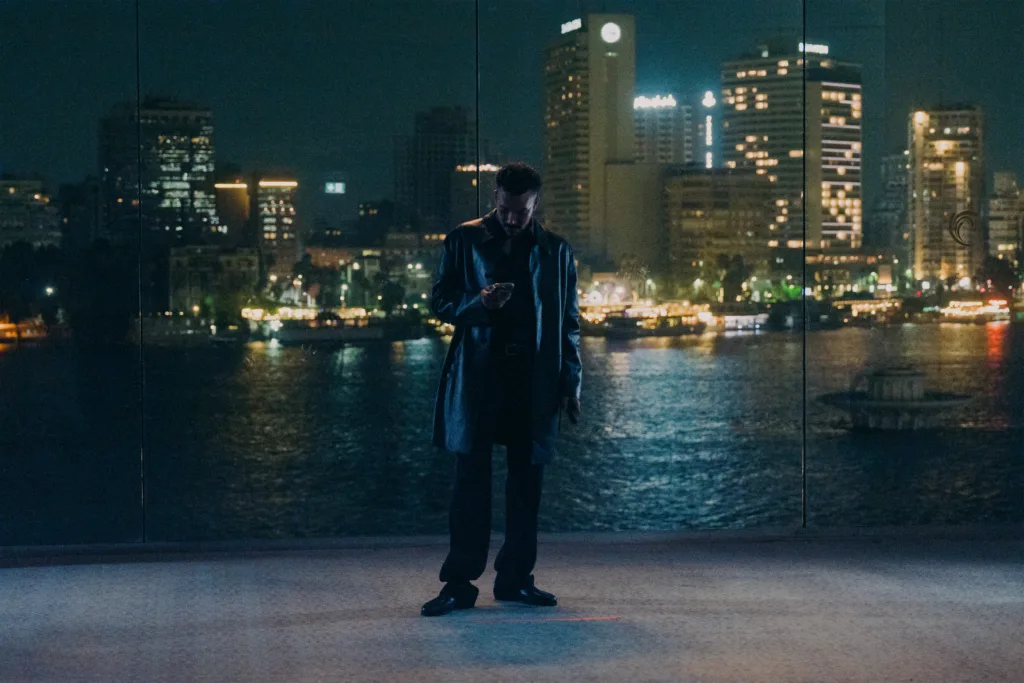
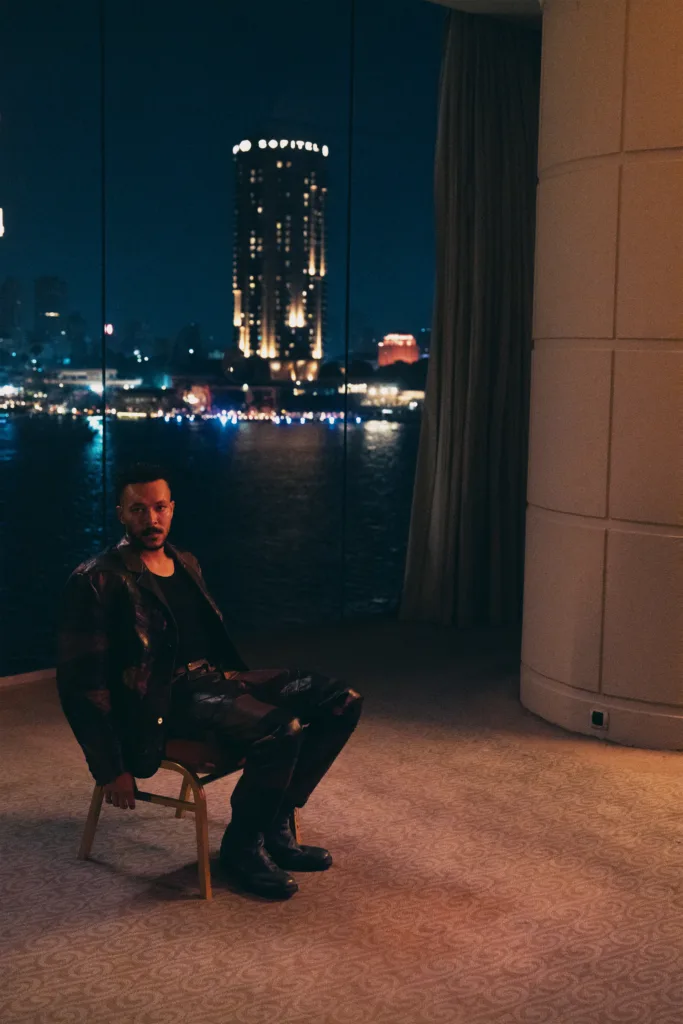
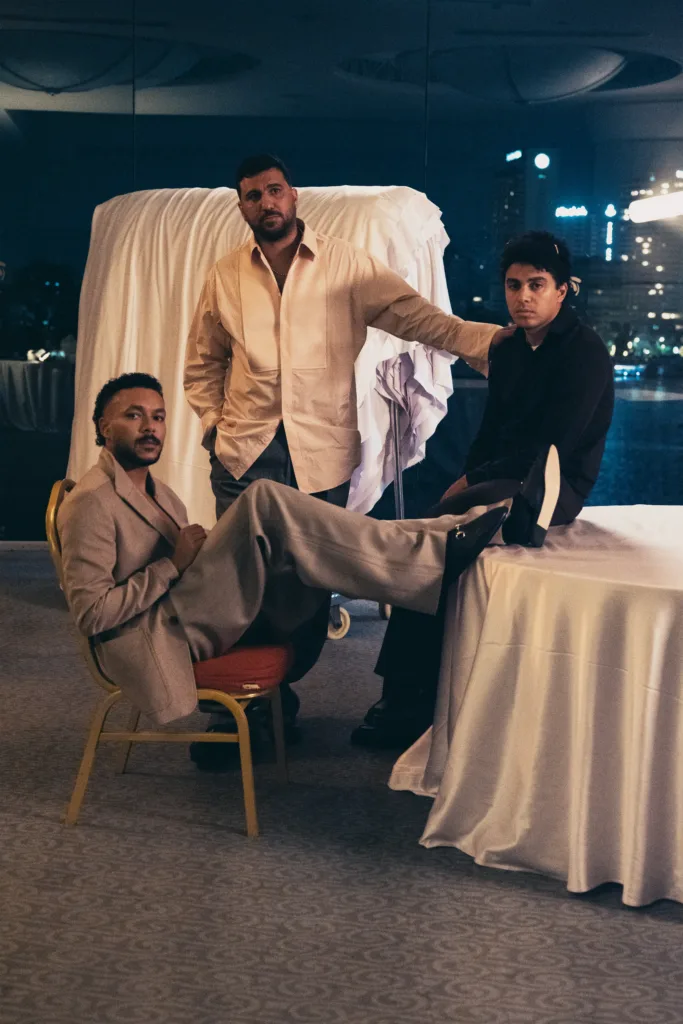

Asem wears jacket Y-3, shirt YOHJI YAMAMOTO, tie GUCCI, trousers ZEGNA
I was invited to meet Wegz at the studio of his recent collaborator, producer Hussein Gamal, with whom he worked on his new album, Aqareb. Gamal welcomed me in as he busied himself setting up his new space, chatting casually as we waited for Wegz to arrive. When he finally walked in – olive oil bottle in hand, a pack of American Spirit tobacco peeking from the left pocket of his denim – there was no formal introduction. We dove straight into a conversation about music before the interview even began.
We discuss the current state of the hip hop scene and, when I raise the idea of pop’s increasing infiltration into rap, he pushes back, dismissing the notion that pop music even exists in the traditional sense. For Wegz, ‘pop’ has become an increasingly vague label that can be applied to virtually any popular style of music. The conversation around pop versus rap, however, is integral to understanding his career trajectory and the way he moves as an artist.
Since the release of his hit single “El Bakht” in 2021, Wegz has evolved into a new breed of Egyptian music artist, a crossover between rap and traditional popular music that had not been seen before. He penetrated a space once considered out of reach for rappers, combining the raw edge and lyrical sensibility of hip hop with the mass appeal of pop, creating a sound that resonated across audiences far beyond the genre’s usual borders. And in doing so, he not only expanded his artistic reach, but also opened the door for others to follow, reshaping the possibilities for what a rap artist in Egypt could achieve. But before that, Wegz was at the forefront of a movement that completely disrupted the dynamics of Egypt’s music industry and, arguably, reshaped the entertainment landscape altogether.
It was a movement that belonged to the post-revolution young and restless, navigating uncertainty and searching for a voice to articulate their frustrations, ambitions, and truth. Rap was the medium, carrying the nuances of a generation that chose to play the game rather than rebel against its rules, a generation intent on winning no matter the consequences—and Wegz stood as a true representation. Rap was not welcomed by the mainstream at the time; it was little more than a niche subculture scattered through tight circles across the nation. That was before he helped drive the genre to unprecedented heights of commercial success and widespread appeal, crossing socioeconomic lines and ultimately becoming the new musical zeitgeist.
The rapper’s rise coincided with a wider Arab rap awakening, and he quickly became one of its central figures. Through a string of cross-border collaborations with Morocco’s ElGrandeToto, Syria’s Bu Kolthoum, and Algeria’s Savage Plug, he helped position Egyptian rap within a larger regional conversation. These partnerships, coupled with his hybrid approach between rap and pop, expanded the genre’s reach beyond national borders and accelerated its momentum across the Arab world. His performance at the FIFA World Cup in Qatar further crystallised this shift—unprecedented for an Arab rapper, that moment underscored how the genre had broken through to mainstream recognition.
Rap spoke directly to this generation. I still remember the time after “TNT” dropped in 2018. That skinny youngster mumbling his way through verses, almost unintelligible at times, was unlike anything we had heard before. As cliché as it may sound, you just had to be there. For much of my generation, it was the first time we felt music that truly resonated, that reflected our own experiences and gave us a sense of being understood. Rap in Egypt was reborn, breaking away from the outdated perceptions that had once defined it: the preachiness, the lyrical acrobatics, the overtly political posturing. In its place emerged something more direct and unfiltered, speaking to real struggles, everyday challenges, ambitions, and dreams.
In a 2019 interview with SceneNoise, a young Wegz walked freely through his neighbourhood in Al Wardiyan on the outskirts of Alexandria, chasing greatness and expressing those dreams with calm conviction, almost as if he could see through the uncertainties. “This is the future of music in Egypt,” he predicted, foreshadowing his destiny. “It’s the sound that will take over. This is the wave.” Rap, at the time, had yet to cross into the mainstream, but his words captured a moment of rapid change in the scene’s history, a self-fulfilling prophecy that would not only prove true, but also surpass all expectations.
Rap was becoming too large to ignore. Teenagers were turning into stars on their own terms—not through PR strategies or industry agendas, but by force of presence. There was a palpable sense of competition that pushed the entire scene forward. Releases came in quick succession as unfiltered expressions of talent, not part of calculated rollout plans. And it wasn’t only the rappers; producers, photographers, videographers, directors, and designers were all contributing to a collective culture in motion.
Wegz played a central role in shaping that scene, emerging as both one of its defining figures and the face of a wider musical movement, alongside other rappers such as Marwan Pablo and Lege-Cy. Within hip hop circles, there was a shared sense that we were witnessing a genuine transformation, a turning point in the history of the genre—and each release only reinforced that feeling. The output was prolific across the scene, but Wegz stood out as the most versatile. His philosophy at the time was driven by experimentation and relentless productivity. While many rappers in that era honed in on a particular strength or sound (Marwan Pablo in trap, Lege-Cy in R&B), Wegz moved fluidly across a wider spectrum, refusing to confine himself to a single genre or voice, though hip hop always remained the anchor.
He rapped his heart out about everything, from chasing money to fractured relationships, delivering street-level poetry second to none. His use of pure Alexandrian slang, meanwhile, distinctly shaped Wegz’s writing, making it unmistakably his. Referencing Franz Kafka and dreams of Paris, his early music functioned as a living documentation of a success story unfolding in real time, with each release reinforcing his narrative. It was never a constructed image, but something organic, born out of both highs and lows. And through it all, Wegz remained undeterred and laser-focused on the path ahead.
Some of his tracks leaned towards pop, others closer to R&B (as in “Saleny” or “Skerty”). The likes of “Bazeet” and “Porsche” dove headfirst into trap, while “Laqtta” and “Ali Baba” tapped into shaabi influences. It was a range that could easily have backfired, but Wegz managed to excel across most of these spaces. Keeping up with his releases was difficult; they arrived like an endless stream and, with each one, his identity as an artist with a distinct voice grew sharper. Then came “Dorak Gai”, and everything shifted to another level of success and recognition.
With the song’s release, rap had its definitive breakthrough into the mainstream—a turning point in the Egyptian music scene. The track became an anthem during the COVID lockdown, played everywhere by hip hop fans and casual listeners alike. Looking back, Wegz resists the idea of it as a single decisive moment: “I don’t think it was a turning point,” he differs. “All of these moments were part of a larger process, small steps taken one at a time to get to the place where I am now.”
From his perspective, it was simply another step in a longer journey. But from the outside, at least, “Dorak Gai” was a watershed moment. Rap in Egypt was not the same before and after its release. The song pushed the entire scene into a wider cultural spotlight and accelerated its transformation into a movement that could no longer be ignored.
Since the emergence of that wave, Wegz has managed to remain at the top, taking this singular approach that diverged from the traditional music output, one that was centered around consistent single releases. With several hits from “TNT” to “El Bakht”, he built a discography that broke from convention, but kept him firmly in the conversation. “I’ve changed for sure, but it’s still the same hunger and the same drive,” he says when I ask about the difference between the artist who made “TNT” in 2018 and the person he is today. He name-drops Mo Salah several times during our conversation and, much like the footballer, it’s all about practice and maintaining form for him. Consistently creating and honing his craft, Wegz takes an almost athletic approach to music-making that has distanced him from his contemporaries. He is now thinking about legacy, hence the decision to put out a complete project.
He admits to me that legacy was never something he contemplated or sought after, yet I can’t help but imagine that if Wegz were to retire from music even now, a legacy would still be there. It’s that sense of disregarding the outcome entirely that defines an artist of his calibre—a denial of success, if you will. Even at the very top, his hunger for more outweighs the glamour of fame and the millions of streams. Wegz doesn’t seem to feel the extent of his success or, perhaps, he chooses not to. “That’s the thing, if I saw myself as Michael Jackson, that would mean I’m done,” he says. “I may have achieved what I wanted, but it doesn’t work like that. You work hard without asking what you’ll get in return. You do your part, and when something comes your way, you do it as best as you can. There’s still work to do. As long as you haven’t made all the music you want to make, you’re not done.”
The rapper’s state of mind oscillates between this unyielding hunger for more and a grounded sense of humility. And he is acutely aware of his status as one of the region’s most influential artists. “Top of the region, then what?” he wonders aloud before quickly acknowledging that, at the end of the day, he is simply human. There is no pretension in the way he speaks, only a quiet recognition of change. “I’m growing, opening my mind to things. Some things don’t bother me anymore, some things bother me more. I judge less, I’m more accepting. I take people and things as they are. I’ve started realising my place in the world. I can make great music, but I can’t change the world,” he says, reflecting with the calm certainty of someone who has navigated both the chaos of fame and the solitude it leaves behind.
On a personal level, Wegz is in a period of growth. Professionally, he is entering one of his most active phases yet. There’s a full-length debut album, dense with collaborations; a lead role in a film directed by Ali El Arabi and starring Tara Emad and Huda El-Mufti; and early work already underway on the album to follow, which he plans to release next year. Rather than settling into a comfortable distance from the industry, the rapper remains in motion, methodical in his choices and deliberate in his pace.
In preparing for this release, Wegz was intentional about giving it room to stand on its own. “I put out Gadwal El Darb to make room for Aqareb, which is broader and closer to what I truly want to do,” he explains. Across 12 tracks, he frames it as a journey through different states of feeling, each revealing a part of what he wants to express. For him, the record carries a particular force: “Even speaking as a fan, I think this album is the best thing I’ve heard all year. It’s weighty, both musically and emotionally, and it comes from a very real place.”
Conscious of the fact that he is now speaking to the masses, Aqareb marks the biggest release of the rapper’s career—no longer is his music made for a small community on SoundCloud, but built for wide release. With that reach comes a certain influence, one he acknowledges but refuses to let shape his process. He insists on maintaining the same approach to music making, unbothered by the pressures of scale. Aqareb is not a concept album, but a collection of songs that reflect his life and the things he’s going through now. He describes it as a confrontational record, one born from deep thought. “You sing to your own community,” he tells me. “If you try to speak to the whole world, your words lose meaning. But after deep thought, maybe you can say something to everyone, face the crowds by saying, ‘This is my truth.’”
What lingers most after our conversation isn’t the degree of Wegz’s success, but the clarity with which he carries it. He refuses to mythologise himself, to treat his music as anything other than the work of showing up and chiselling away until something true emerges. That refusal to settle, to play into the image of an untouchable star, may be his sharpest edge. In an industry quick to crown and discard, he moves with the quiet conviction that the only measure worth holding onto is whether his next song cuts deeper than the last.
DOP OSAMA CORNAWY, Dazed MENA creative producer FATIMA MOURAD, creative producer MONICA ABADIR, make-up MARIAM HABASHI, hair MO’MEN TURK, photo assistant ABDELRHMAN OMAR, ACs MU TAREK, OMAR YAHIA, gaffer AHMED AMMAR (BAKAR), VHS SALMA SROUR, production assistants MOHANNAD EL MORSY, GHAIDAA HAMMAM, wardrobe supervisor AHMED ZIKA, location HILTON CAIRO GRAND NILE REVOLVING RESTAURANT, special thanks HILTON CAIRO GRAND NILE REVOLVING RESTAURANT, MAZEEJ BALAD
